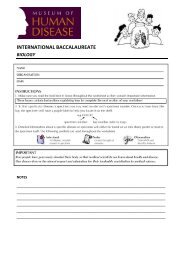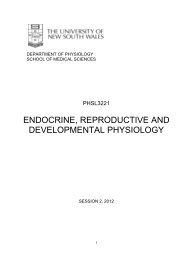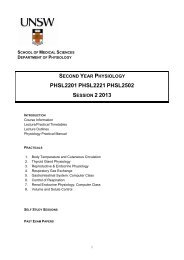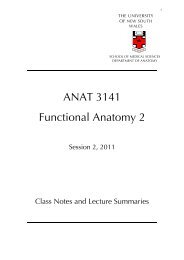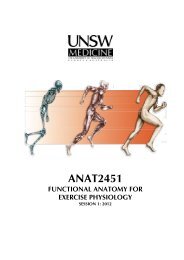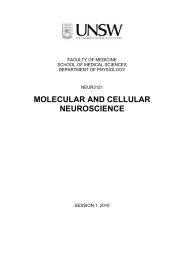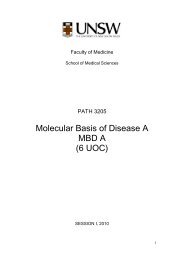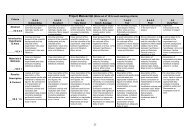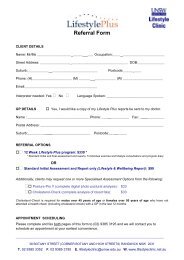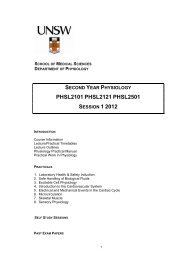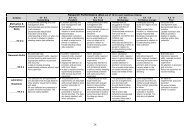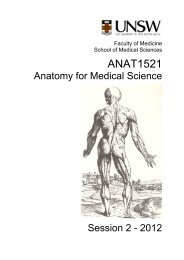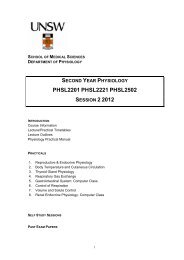endocrine, reproductive and developmental physiology - School of ...
endocrine, reproductive and developmental physiology - School of ...
endocrine, reproductive and developmental physiology - School of ...
Create successful ePaper yourself
Turn your PDF publications into a flip-book with our unique Google optimized e-Paper software.
Practical sessions <strong>and</strong> discussion classes are designed to give you a deeper underst<strong>and</strong>ing <strong>of</strong><br />
particular aspects <strong>of</strong> the course. The two ‘Glycaemic Index’ classes investigate the concept <strong>of</strong> glycaemic<br />
index <strong>and</strong> enable you to think critically about the usefulness or otherwise <strong>of</strong> glycaemic index as a tool for<br />
dietary management [learning objective 6]. In these 2 classes you will obtain data from experimental<br />
subjects <strong>and</strong> consider how to analyse the data <strong>and</strong> present it [learning objective 6]. You will consider the<br />
<strong>endocrine</strong> <strong>and</strong> renal control <strong>of</strong> circulating volume in the discussion class on ‘Hormonal effects <strong>of</strong> water<br />
immersion’ [learning objective 1a]. In the practical class on the ‘Placenta <strong>and</strong> Fetal membranes’ you will<br />
examine museum <strong>and</strong> wet specimens <strong>of</strong> placenta <strong>and</strong> membranes at various stages <strong>of</strong> gestation <strong>and</strong><br />
also use virtual microscopy to further your underst<strong>and</strong>ing <strong>of</strong> these important products <strong>of</strong> conception<br />
[learning objective 1c]. During a visit to the neonatal intensive care unit at the Royal Hospital for<br />
Women, R<strong>and</strong>wick you will have a ‘once in a lifetime’ opportunity to see how our underst<strong>and</strong>ing <strong>of</strong> fetal<br />
<strong>and</strong> neonatal <strong>physiology</strong> is applied to treating preterm infants [learning objective 2]. You will also<br />
critically analyse <strong>and</strong> present a research topic related to reproduction, <strong>developmental</strong> or fetal <strong>physiology</strong><br />
in the form <strong>of</strong> a poster presentation [learning objectives 7 & 8].<br />
3. ASSESSMENT<br />
Component<br />
Mark allocation<br />
PBL classes 10%<br />
Endocrinology assignment 10%<br />
Poster presentation 10%<br />
Exam 1 (Endocrine & Reproduction) 35%<br />
Exam 2 (Developmental <strong>physiology</strong>) 35%<br />
Total 100%<br />
Details <strong>of</strong> assessment components <strong>and</strong> their rationale<br />
The assessment components in this course are designed to help you to develop the skills outlined in the<br />
specific learning outcomes, as well as assessing your knowledge.<br />
Problem Based Learning Classes. Your participation in three <strong>of</strong> the four problem based learning (PBL)<br />
classes contributes 10% to your final mark. A description <strong>of</strong> problem based learning <strong>and</strong> its assessment<br />
is included on the following pages.<br />
Endocrinology Assignment. This written report based on a case study in endocrinology will contribute to<br />
10% <strong>of</strong> your final mark <strong>and</strong> should be h<strong>and</strong>ed in to the <strong>School</strong> <strong>of</strong> Medical Sciences Office (MG14,<br />
Ground floor, Wallace Wurth Building) by 5 pm Friday <strong>of</strong> Week 8 (17/9/09). Details about this<br />
assignment will be available on Blackboard. This exercise addresses the specific learning objectives 1b,<br />
4 <strong>and</strong> 5 (above). Please note that late submission <strong>of</strong> this assignment will incur a penalty.<br />
Poster Presentation. In the final week <strong>of</strong> session, you will present a poster providing up to date<br />
information on a topic relating to reproduction, fetal or <strong>developmental</strong> <strong>physiology</strong>, which will constitute<br />
10% <strong>of</strong> your final mark. You will work in small groups to prepare <strong>and</strong> present your posters, <strong>and</strong> you will<br />
be assessed during the session both by your peers <strong>and</strong> by members <strong>of</strong> the academic staff. Each<br />
member <strong>of</strong> the group is expected to participate in the poster presentation, <strong>and</strong> attendance is required for<br />
both poster sessions. Topics <strong>and</strong> further details will be provided later in the session. The poster session<br />
helps to achieve specific learning objectives 1c, 2, 4, 5, 7 <strong>and</strong> 8.<br />
Examinations. Two 90 minute examinations <strong>of</strong> equal weighting are given in this subject. The first will be<br />
held on Tuesday 14th September (Week 8) <strong>and</strong> covers all material relating to the Endocrinology <strong>and</strong><br />
some <strong>of</strong> the Reproductive Physiology components <strong>of</strong> the course, including the Glycaemic Index<br />
practicals <strong>and</strong> the first three PBLs. The second will be held in the <strong>of</strong>ficial examination period <strong>and</strong><br />
assesses only the remaining Reproductive Physiology components <strong>and</strong> all Fetal <strong>and</strong> Developmental<br />
Physiology component. The material which will be covered in the second exam is marked with an<br />
asterisk in the timetable. Note this includes the fourth PBL <strong>and</strong> the Placenta <strong>and</strong> Fetal Membranes<br />
7



